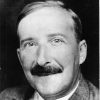Quotations by:
Zweig, Stefan
It always demands a far greater degree of courage for an individual to oppose an organized movement than to let himself be carried along with the stream — individual courage, that is, a variety of courage that is dying out in these times of progressive organization and mechanization. During the war practically the only courage I ran across was mass courage, the courage that comes of being one of a herd, and anyone who examines this phenomenon more closely will find it to be compounded of some very strange elements: a great deal of vanity, a great deal of fear — yes, fear of staying behind, fear of being sneered at fear of independent action, and fear, above all, of taking up a stand against the mass enthusiasm of one’s fellows.
Unhappiness makes people vulnerable, incessant suffering unjust. Just as in the relations between a creditor and a debtor there is always an element of the disagreeable that can never be overcome, for the very reason that the one is irrevocably committed to the role of giver and the other to that of receiver, so in a sick person a latent feeling of resentment at every obvious sign of consideration is always ready to burst forth.
For one’s emotional state is always determined by the oddest and most accidental things, and it is precisely the most superficial factors that often fortify or diminish our courage.
Stefan Zweig (1881-1942) Austrian novelist, playwright, journalist, biographer
Beware of Pity (1939)
(Source)
Lightly, caressingly, Marie Antoinette picked up the crown as a gift. She was still too young to know that life never gives anything for nothing, and that a price is always exacted for what fate bestows. She did not think she would have to pay a price. She simply accepted the rights of her royal position and performed no duties in exchange. She wanted to combine two things which are, in actual human experience, incompatible; she wanted to reign and at the same time to enjoy.
Stefan Zweig (1881-1942) Austrian novelist, playwright, journalist, biographer
Marie Antoinette (1932)
(Source)
Only ambition is fired by the coincidences of success and easy accomplishment but nothing is quite as splendidly uplifting to the heart as the defeat of a human being who battles against the invincible superiority of fate. This is always the most grandiose of all tragedies, one sometimes created by a dramatist but created thousands of times by life.
Under normal circumstances, the name a human being bears is no more than the band is to a cigar: a means of identification, a superficial, almost unimportant thing that is only loosely related to the real subject, the true ego. In the event of a success the name begins to swell, so to say. It loosens itself from the human being that bears it and becomes a power in itself, a force, an independent thing, an article of commerce, a capital asset; and psychologically again with strong reaction it becomes a force which tends to influence, to dominate, to transform the person who bears it.
Stefan Zweig (1881-1942) Austrian novelist, playwright, journalist, biographer
The World of Yesterday [Die Welt von Gestern], ch. 13 (1942)
(Source)
All the livid steeds of the Apocalypse have stormed through my life — revolution and famine, inflation and terror, epidemics and emigration. I have seen the great mass ideologies grow and spread before my eyes — Fascism in Italy, National Socialism in Germany, Bolshevism in Russia, and above all else that arch-plague nationalism which has poisoned the flower of our European culture.
Stefan Zweig (1881-1942) Austrian novelist, playwright, journalist, biographer
The World of Yesterday [Die Welt von Gestern], Preface (1942)
(Source)
Alternate translation [Sonnenfeld]:
All the pale horses of the apocalypse have stormed through my life, revolution, starvation, devaluation of currency and terror, epidemics, emigration; I have seen the great ideologies of the masses grow and spread out before my eyes. Fascism in Italy, National Socialism in Germany, Bolshevism in Russia, and, above all, that arch-pestilence, nationalism, which poisoned our flourishing European culture.

